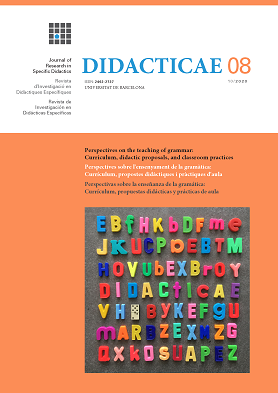Using aspects of generative grammar in L1 and L2 grammar teaching
DOI:
https://doi.org/10.1344/did.2020.8.97-121Keywords:
theoretical linguistics, generative grammar, grammar teaching, Greek as L1, English and German as L2Abstract
In this paper we propose that the concepts and findings of Theoretical Linguistics should inform language teaching, for both L1 and L2. In particular, with respect to grammar teaching, we suggest that the Generative Grammar framework (Chomsky, 1986, 1995, 2000) should be adopted for the description of language systems at school, given that it offers the appropriate theoretical background, i.e. the existence of universal principles, on the one hand, common across all natural languages, and parameters, on the other, which differentiate them with respect to their specific characteristics. Taking into consideration the significant differentiation in the description of language systems, which appears in descriptive/reference grammars of languages and consequently in grammar teaching, found in first and foreign language course books, we aim to overcome this discrepancy (by adopting basic principles and concepts of Generative Grammar), so that language/grammar teaching acquires a uniform, systematic and cross-linguistic character. In this respect, we draw our attention to three representative phenomena, namely a) the realisation (or not) of the pronominal subject, b) clause structure and c) question formation, in Greek (L1), English (L2) and German (L3).
References
Baslis, I. (2006). Introduction to language teaching. A current holistic and communicative approach. Athina: Nefeli [in Greek].
Catsimali, G. (2007). Linguistics in application. Athina: Kardamitsa [in Greek].
Chomsky, N. (1981). Lectures on government and binding. Dordrecht: Foris.
Chomsky, N. (1986). Knowledge of language: Its nature, origin, and use. New York: Praeger.
Chomsky, N. (1995). The minimalist program. Cambridge Mass.: MIT Press.
Chomsky, N. (2000). Minimalist inquiries: The framework. In R. Martin, D. Michaels & J. Uriagereka (Eds.), Step by step. Essays in honor of Howard Lasnik (pp. 89-155). Cambridge Mass.: MIT Press.
Clairis, Ch., Babiniotis, G. et al. (2005). Grammar of Modern Greek. Structural-gunctional – communicative. Athina: Ellinika Grammata [in Greek].
Drosdowski, G., Müller, W., Scholze-Stubenrecht, W., & Wermke, M. (1995). Duden. Grammatik der deutschen Gegenwartssprache (5. Aufl.). Mannheim: Dudenverlag.
Eisenberg, P. (1989). Grundriss der deutschen Grammatik (2. Aufl). Stuttgart: Metzler.
Georgiafentis, M., Kotzoglou, G., & Philippaki-Warburton, I. (2011). The contribution of linguistic research in school grammar: Issues related to the analysis of language in ‘Γραμματική Ε΄ και Στ΄ Δημοτικού’). Studies in Greek Linguistics, 31, 76-88 [in Greek].
Georgiafentis, M., & Tsokoglou, A. (2017). Linguistics and teaching: Grammar teaching in foreign language course books. Paper presented at the conference “The Greek School today”, 1-2 December 2017, NKUA [in Greek].
Grewendorf, G. (1988). Aspekte der Deutschen Syntax. Studien zur Deutschen Grammatik 33. Tübingen: Narr.
Grewendorf, G. (2002). Minimalistische Syntax. Tübingen Franke Verlag.
Haegeman, L. (1994). Introduction to Government & Binding Theory (2nd ed.). Oxford: Blackwell.
Haegeman, L., & Guéron, J. (1999). English grammar: A generative perspective. Oxford: Blackwell.
Heidolph, K., Flämig, W., & Motsch, W. (1984). Grundzüge einer deutschen Grammatik (2. Aufl.). Berlin: Akademie-Verlag.
Hawkins, R. (2001). Second language syntax: A generative introduction. Oxford: Blackwell.
Holton, D., Mackridge, P., & Philippaki-Warburton, I. (1997). Greek: A comprehensive grammar of the modern language. London: Routledge.
Holton, D., Mackridge, P., & Philippaki-Warburton, I. (2012). Greek: A comprehensive grammar (2nd ed., revised by V. Spyropoulos). London: Routledge.
Helbig, G., & Buscha, J. (1993). Deutsche Grammatik. Leipzig: Langenscheidt.
Huddleston, R., & Pullum, G. K. (2005). A student’s introduction to English grammar. Cambridge: Cambridge University Press.
Κlidi, S., & Tsokoglou, A. (2014). Current linguistics in grammar teaching in secondary education. Studies in Greek Linguistics, 34, 231-243 [in Greek].
Koutsogiannis, D. (2017). Language teaching: Yesterday, today, tomorrow. A political approach. Thessaloniki: Institute of Modern Greek Studies [in Greek].
Leech, G., & Svartvik, J. (2002). A communicative grammar of English (3rd ed.). London: Routledge.
Mitsis, N. (1998). Language teaching: From language theory to teaching practice. Athina: Gutenberg [in Greek].
Parrot, M. (2003). Grammar for English language teachers. Cambridge: Cambridge University Press.
Philippaki-Warburton, I. (1992). Introduction to theoretical linguistics. Athina: Nefeli [in Greek].
Radford, A. (1988). Tranformational grammar: A first course. Cambridge: Cambridge University Press.
Roussou, A. (2015). Syntax. Grammar and Minimalism. Available at https://repository.kallipos.gr/handle/11419/581 [in Greek].
Tzartzanos, A. (1991/1945). Modern Greek Syntax. Vol. I. Athina: Afoi Kyriakidi [in Greek].
Theophanopoulou-Kontou, D. (2002). Generative syntax: The framework of Government and Binding. Athina: Kardamitsa [in Greek].
Tsokoglou, A. (2011). Satzstruktur und Wortstellung im Deutschen und Griechischen: theoretische und sprachdidaktische Aspekte. Schnittstellen von Linguistik und Sprachdidaktik in der Auslandsgermanistik (SL&SD 2009). Athen: NKUA.
Underwood, P. (2017). Challenges and change: Integrating grammar teaching with communicative work in senior high school EFL classes. SAGE Open July-September 2017, 1-15.
van Rijt, J., & Coppen, P-A. (2017). Bridging the gap between linguistic theory and L1 grammar education – experts’ views on essential linguistic concepts. Language Awareness, 26, 360-380.
White, L. (2003). Second language acquisition and Universal Grammar. Cambridge: Cambridge University Press.
Zifonun, G., Hoffman, L., & Strecker, B. (1997). Grammatik der deutschen Sprache. Bd 2. Berlin: Walter de Gruyter.
Downloads
Published
Issue
Section
License
Copyright (c) 2020 MIchaelis Georgiafentis

This work is licensed under a Creative Commons Attribution-ShareAlike 4.0 International License.
The authors who publish in this journal agree to the following terms:
- Authors retain copyright and grant the journal the right of first publication.
- Submitting a paper does not involve paying any fees.
- Texts will be published under a Creative Commons Attribution Share-Alike 4.0 International License that allows others to share the work, provided they include an acknowledgement of the work’s authorship, its initial publication in this journal and the terms of the license.
- When citing works published in Didacticae, both the autor and the journal must be cited.
- Didacticae does not accept any responsibility for the points of view and statements made by the authors.



